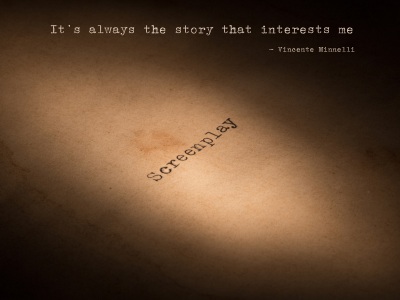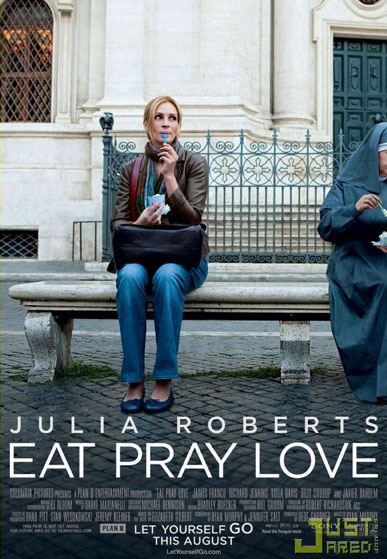Last updated on October 31st, 2023 at 05:47 pm
 Dreams of seeing your screenplay produced can be a powerful motivator for any aspiring screenwriter. To learn more about the nuances of storytelling on screen, it’s worth taking a closer look at films like Eat Pray Love and analyzing them from a screenwriter’s perspective.
Dreams of seeing your screenplay produced can be a powerful motivator for any aspiring screenwriter. To learn more about the nuances of storytelling on screen, it’s worth taking a closer look at films like Eat Pray Love and analyzing them from a screenwriter’s perspective.
Have you seen the movie?
Did you enjoy the travelogue aspect of it?
Do you think the film did justice to Elizabeth Gilbert’s best-selling book?
Let’s dive into a discussion of the challenges and lessons for screenwriters.
I was meeting some of my girlfriends at the theater where we were going to premiere the film. Three of them had read (and loved) the book. Women are really an underserved demographic when it comes to movies. Since the book was on the New York Times Bestseller list for so many months, an Oprah Book Club selection, and was all the buzz amongst so many women, we assumed people would be beating the doors down to see it.
Some came in pairs, others in groups. My guess is there were even some book club members in attendance. There was even a smattering of men scattered in a sea of women. The theater was packed when the lights went down, and my hopes were high that the movie would take everyone away on Elizabeth’s soul-searching journey. The movie’s beginning gives short shrift to the unraveling of Elizabeth’s marriage (to Billy Crudup) and subsequent divorce. She takes on a much younger boyfriend she tires of after only a couple of weeks (although in the book, he tires of her).
She decides to embark on a year-long journey of self-recovery and discovery. My first thought is the same as when I read the book: How can she afford this extravagant trip? Liz’s sojourn was funded by a generous advance of $200,000 to write the memoir. She was to pen this book after her return to the U.S. from her travels. Some may question the integrity of the valid reason for her trip–this advance was not mentioned in the movie or the book.
Let’s dig in…
1. Understanding the Intent of a Film:
Movies aim to tell a story and convey characters, time periods, and emotions. Screenwriters, in particular, pay close attention to a film’s intent and how effectively it achieves that. When you sit down to watch a movie, consider what the filmmakers are trying to communicate and whether they succeed. The film opens with a scene of Julia Roberts, who plays the protagonist, Elizabeth Gilbert, lying on her bathroom floor. She is in a state of emotional crisis and feeling lost and overwhelmed. This opening scene is supposed to reflect her inner turmoil and set the stage for her journey of self-discovery throughout the movie. But I think this was a mistake to start at this moment as we don’t feel anything for her character yet, and who wants to lay on a bathroom floor that is shared with men? She seeks to find herself because she is tired of smelling urine around the toilet?
2. Book-to-Film Adaptations:
Adapting a book into a movie is a daunting task. It’s essential to recognize that not every detail from the book can be translated to the screen successfully. The Eat Pray Love memoir had its share of ardent fans and passionate critics, and the film adaptation faced the challenge of pleasing a diverse audience. It’s a reminder that book-to-film adaptations rarely satisfy everyone, and I understand that some degree of creative license is often necessary. Let me make this perfectly clear: I didn’t finish the book. I made it only half the way through Liz’s time in Italy. I could no longer stomach her narcissism and me-me-me-isms. People either loved or hated the book.
3. The Power of Editing:
The saying that “films are edited, not made” holds a lot of truth. Editing is critical in shaping a movie’s narrative and visual appeal. Editors must ensure that scenes flow seamlessly and transitions between shots are smooth. In Eat Pray Love, some transitions felt jarring or distracting, affecting the overall viewing experience.
As a screenwriter, I appreciate the importance of effective editing in crafting a compelling narrative. In Eat Pray Love, the way some of the scenery was filmed, it was hard to stay visually with a scene. The film scenes sometimes would swoop down on the characters like some hawk about to grab them and take off in flight. This type of transition was annoying. The film could be visually beautiful in some scenes and dark and gungy in others.
4. Exploring Inner Turmoil:
One of the challenges the Eat Pray Love film faced was the lack of depth in portraying Elizabeth Gilbert’s inner turmoil and depression. It’s a crucial lesson for screenwriters: inner conflicts and character development are as vital as external journeys. Understanding a character’s emotional journey can make a story more relatable and engaging. The screenwriters Ryan Murphy and Jennifer Salt fail horribly to elaborate on her inner turmoil and depression. It feels more like a mission for soul searching.
Film critic Dezhda Gaubert wrote: “There are always changes made to the book that ironically water down the plot instead of bringing it into focus. There’s no clear inciting incident that launches Liz’s nervous breakdown (indeed, in the movie, she doesn’t have one); thus, the stakes are low, certainly not enough to send a woman off on a yearlong trip to foreign lands.”
5. Casting Choices:
The choice of cast can significantly impact a movie’s success. In this case, Julia Roberts, a Hollywood icon, was cast in the lead role. While she is undoubtedly a talented actress, her star power sometimes overshadowed the character she portrayed. As a screenwriter, consider how casting can affect the audience’s perception of the character. In some instances, selecting a lesser-known actor may enable viewers to connect more deeply with the character. Casting is vital to a movie’s success.
I believe an unknown should have been cast for the role of Elizabeth Gilbert. The viewer could focus on the role and the unfolding story. It’s hard to see past Julia Roberts, a larger-than-life Hollywood star, to the character being portrayed. Julia seems to play herself in most of the roles she plays. It felt like Julia Roberts playing Julia Roberts. Personally, I clearly felt more of an emotional connection with the Richard From Texas (Richard Jenkins) and Felipe (Javier Bardem) characters. These two roles had more backstory in their limited time on the screen than Liz, who was virtually in every movie frame.
6. The Book vs. The Movie:
Screenwriting can be a tricky art, and translating a beloved book into a successful film is no easy feat. Eat Pray Love received mixed reviews from critics and audiences alike, showcasing adaptation challenges. It’s a reminder that screenwriters must navigate the fine line between staying true to the source material and crafting a compelling cinematic experience. Eat Pray Love has proven my point that books rarely translate well into movies. The website Rotton Tomatoes gave the movie a 38% on the Tomatometer. The Tomatometer measures the percentage of positive reviews from approved critics.
Movie critic Randy Cordova stated: “In the memoir, Liz emerged as self-absorbed, spoiled, and emotionally reckless. She wasn’t terribly likable, but she was oddly compelling. In the movie, the emphasis has shifted a bit; you’ve got a character that is a lot more likable, BUT she is a lot less interesting.”
Advice for Aspiring Screenwriters:
• Stay True to the Characters: When adapting a story, focus on capturing the essence of the characters, even if you need to make some changes to fit the medium.
• Embrace Inner Conflict: A character’s emotional journey is often the heart of a story. Explore their internal struggles and growth.
• Choose Your Cast Carefully: Consider the impact of casting choices on the audience’s perception of the characters. Sometimes, lesser-known actors can provide a fresh perspective.
• Editing Matters: Appreciate the role of editing in shaping a film’s narrative. Smooth transitions and well-paced storytelling are critical.
• Learn from the Failures: Not all films will be well-received, but you can learn valuable lessons from the successes and failures of book-to-film adaptations.
Eat Pray Love is a case study of the challenges of adapting books into films. While the movie had its share of criticisms, it offers valuable insights for aspiring screenwriters. Embrace these lessons as you work on your own projects, always striving to tell compelling stories that captivate audiences. Remember that the journey of a screenwriter is a learning process, and every film, whether successful or not, provides an opportunity for growth and improvement.
And my review of the film? One popcorn bag out of 10. I would not recommend this movie, as it seems as contrived as Sex and the City Part II. Don’t get me started on that shallow mess.
Lights out.
———-
Since the release of this film, Elizabeth Gilbert left her second husband, José Nunes, who was featured at the end of her book and played by Javier Bardem in the film, to enter into a same-sex relationship with her best friend in real life, Rayya Elias. It makes me think about what movie critic Randy Cordova stated: “… Liz emerged as self-absorbed, spoiled, and emotionally reckless….” and that I was right about the book, too.

Enjoy this special 8WomenDream Guest Contributor story submitted by new and experienced big dreamers throughout the world, edited and published to capture a dream perspective from different points of view. Do you have a personal dream story to share with 8WomenDream readers? Click here to learn how to submit dream big articles for consideration.
Note: Articles by Guest Post Contributors may contain affiliate links and may be compensated if you make a purchase after clicking on an affiliate link.




